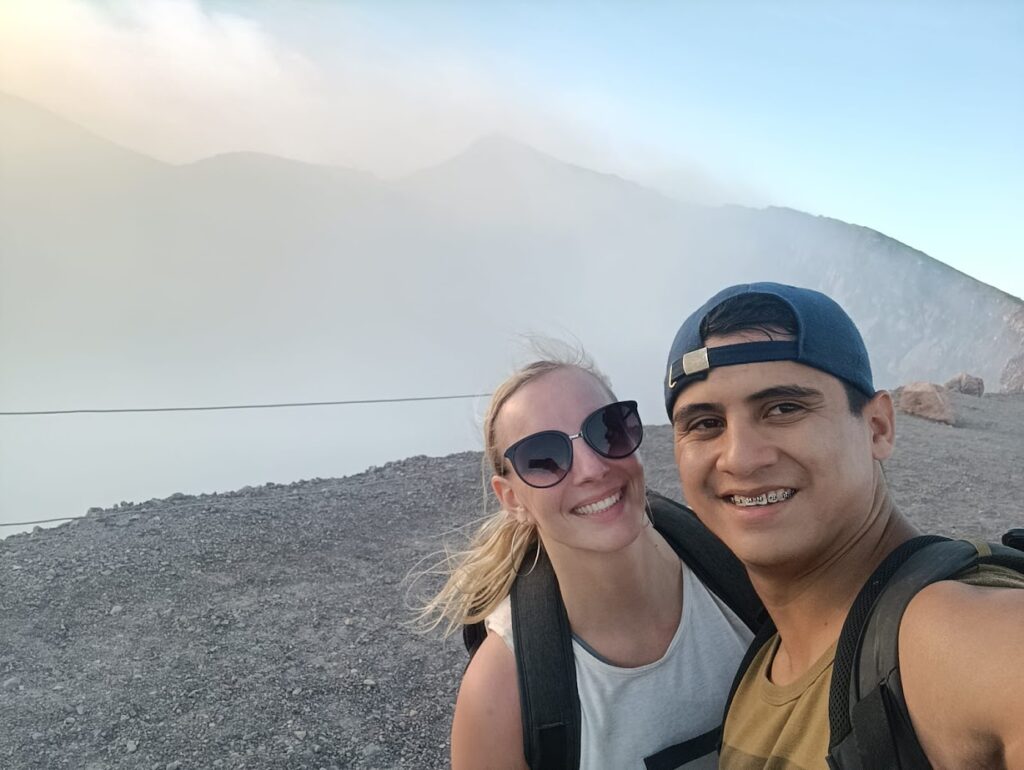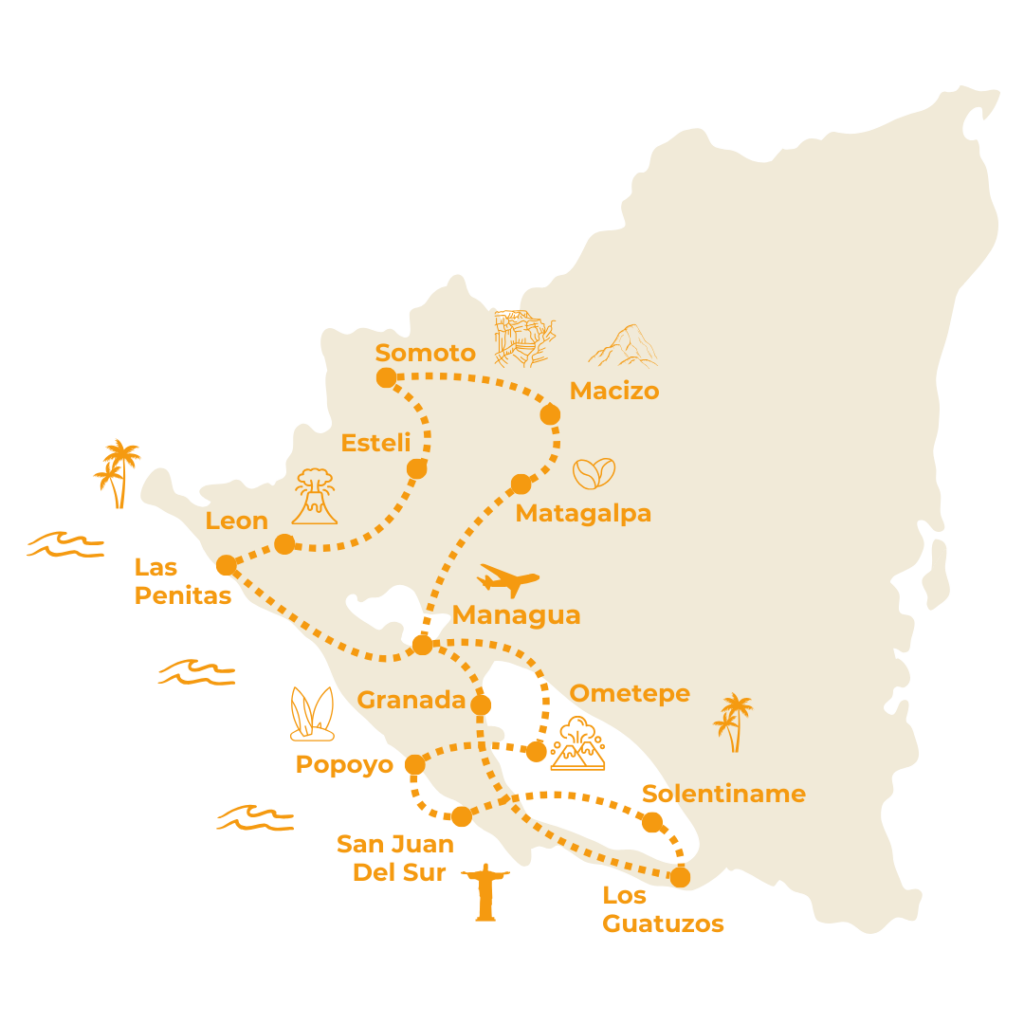contact us
Find us Here
Rpto Vigil
Papalote 1 cuadra al sur
Leon
Nicaragua
Get In touch
+505 8699 1443
[email protected]
Opening Hours
Mon- Fri: 8am- 8pm
Saturday: 9am-8pm
Sunday: 9am-8pm
will take care for the rest

Luggage:
Soft duffel bag or trekking backpack (with rain cover) forget those hard-shell suitcases on wheels, they’ll just slow you down on the road.
Packing cubes = lifesavers! Keep your clothes compact and organized, and separate the wet/dirty ones from the fresh stuff.
A small waterproof daypack for hikes and day trips.
Don’t forget to bring:
Your passport (yep, the golden ticket).
Layered clothing for the tropical climate: light, quick-dry fabrics are your best friend. (Pro tip: leave the denim at home it’s a nightmare in the tropics).
Summer gear: swimwear, t-shirts, tank tops, shorts, etc.
One light sweater and a pair of long pants for travel days or cooler evenings.
Sturdy walking shoes.
Flip-flops or sandals.
A hat or cap.
Sunglasses.
A solid poncho or rain jacket (a long, breathable poncho beats a raincoat in tropical weather skip the cheap disposable ones).
Quick-dry towel.
Mini first aid kit (motion sickness meds if you need them).
Reusable water bottle.
Insect repellent with DEET 50.
Toiletries.
Sunscreen.
Waterproof pouch or drybag for your phone and valuables (a must for water activities & boat rides).
Optional but awesome to have:
- Camera or GoPro
- Portable speaker
- Binoculars
- Rash guard
- Spork or pocket knife
- Reusable containers for snacks/picnics, compact mosquito net…
Pack smart, pack light, and get ready to go Mono Loco in Nicaragua!
The dry season (high season) runs from November to April. Expect sunny skies, almost no rain, and slightly warmer temperatures perfect for beach days, volcano hikes, and exploring cities.
But don’t rule out the rainy season (low season)! From May to October, showers are usually short, heavy bursts that cool things down and keep the landscapes lush and green. You can still travel easily during this time (and bonus: fewer crowds!).
Nicaragua is an adventure all year round. Just pick your vibe and go Mono Loco!
Before you pack your bags and go Mono Loco, make sure your travel health is on point. Recommended shots for Nicaragua include Hepatitis A, Tetanus, Rabies, and Typhoid.
Important: If you’re arriving from a country with a risk of Yellow Fever, you’ll need to show proof of vaccination at the border.
Stay safe, stay healthy, and keep your adventure rolling, because nothing should stop you from volcano boarding, jungle exploring, and beach chilling in Nicaragua!
Think tropical vibes all year round. Temperatures usually hang between 25–32°C (77–90°F), but cities like León can crank it up to 35°C (95°F)+ in March and April.
Nicaragua has two moods:
Dry season (Nov–Apr/early May): sunny skies, little to no rain, perfect for volcano boarding and beach hopping.
Wet season (May–Nov): expect heavy but short bursts of rain, with September and October bringing the most downpours (and sometimes flooding or landslides).
And yep this is the tropics, so tropical storms and hurricanes can happen. The good news? Locals know the drill, and if you listen to warnings, you’ll be just fine.
Yep! Tipping is pretty common here especially in restaurants and bars. If you had an awesome meal or killer service, feel free to leave a little extra love.
On our adventures, you’ll also meet amazing local guides and drivers who make the trip unforgettable. A good rule of thumb? $5–10 USD per day depending on the length and quality of the service. Your tourguide can always give you a heads-up on what’s appropriate.
Tipping isn’t mandatory, but it’s a super nice way to show appreciation and keep the good vibes rolling.
Yes, ATMs are pretty easy to find in cities and towns. But once you head off the beaten path into the villages and rural areas, don’t count on them being around (or even working with your card). Pro tip: check with your bank before you travel to avoid surprises.
Visa tends to be the safest bet here, and credit/debit cards work fine for cash advances. Just keep in mind: when you pay directly with a card, shops often charge an extra 5–10% fee.
Don’t rely on a card alone. Bring some USD cash with you, super easy to exchange and always handy when you’re going in the more remote parts of Nicaragua.
The locals are drinking tap water. And we, Leonel & Margreet, do to. But for your first time to Nicaragua it isn’t safe to drink it. But don’t worry bottled water is everywhere and it won’t break the bank.
On our tours, you’re covered: all the drinks we provide are safe (yep, even the ones with ice), and most hotels and restaurants we visit use purified water too. Still unsure? Just ask your tourguide they’ll point you in the right direction.
Stay cool, stay hydrated, and keep the adventure flowing
Spanish is the official language and you’ll hear it pretty much everywhere across the country. But Nicaragua’s got more voices than just one! On the Caribbean coast, you’ll hear Creole, while communities also keep alive languages like Garífuna and Miskito.
So whether you’re brushing up on your “hola” or curious to dive into local dialects, Nicaragua is a country that speaks in many rhythms and stories.
FAQ

